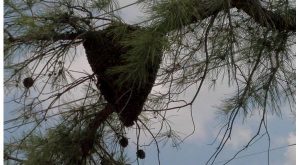
Twin Lakes Area residents looking for a hobby may want to consider two beginning free beekeeping workshops coming up. The first workshop will be held Saturday at Arkansas Game and Fish Fred Berry Education Center in Yellville and the second workshop is on Saturday, March 17th at East Side Baptist Church, located at 718 East 9th St. in Mountain Home. The workshops will be taught by James Rhein, President of the North Central Arkansas Beekeepers Association.Rhein has been teaching the beekeeping class for eight years and had been involved with beekeeping for over 40 years.
Both workshops will start at 9:00 in the morning and end at 4:00 in the afternoon. Participants must provide their own lunch. The workshop at Yellville is free and registration is required. Call 870-449-3484 to register. The workshop in Mountain Home is free and no registration is required.
Rhein says the Yellville workshop is filling up fast, however there may be a cancellation. The Mountain Home workshop has enough space to accommodate 65 people.
According to Rhein, beekeeping is rewarding, educational, fun, relaxing, and self-sustaining. It doesn’t require a lot of time or money and can present some profit.
He says for those who are already a beginning beekeeper, or are interested in becoming a beekeeper, these workshops will increase knowledge and relay the latest information on beekeeping. Topics to be covered include equipment, spring, summer and fall management, requeening, splits, using a smoker, how to properly assemble bee equipment, where to obtain bees and bee law.
Rhein asserts honeybees greatest importance to us is their pollination of all plants, flowers and trees. He says they play a vital role in the success of agriculture today.
He goes on to say beekeeping has progressed a great deal since the earliest of times when they were harvested from hollow trees. Since then, beekeepers have provided a more suitable house for bees that allows harvesting the products more efficiently.
Beekeeping was done with little or no challenges until the 1980s when disease and pests began to destroy the honeybee. Many beekeepers never returned to beekeeping after that time because of the challenges beekeeping faced.
In recent years, easy solutions have been found to address these challenges. The increasing demand for honeybee products all over the world has led to the need for an increase in the number of beekeepers and the need to inform them of the latest methods and materials.
WebReadyTM Powered by WireReady® NSI










